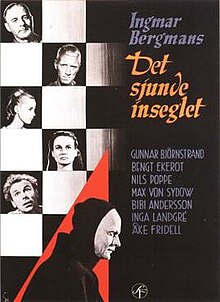The Seventh Seal
| The Seventh Seal | |
|---|---|

Theatrical release poster
|
|
| Directed by | Ingmar Bergman |
| Produced by | Allan Ekelund |
| Screenplay by | Ingmar Bergman |
| Based on |
Trämålning by Ingmar Bergman |
| Starring | |
| Music by | Erik Nordgren |
| Cinematography | Gunnar Fischer |
| Edited by | Lennart Wallén |
| Distributed by | AB Svensk Filmindustri |
|
Release date
|
|
|
Running time
|
96 minutes |
| Country | Sweden |
| Language |
|
| Budget | $150,000 |
The Seventh Seal (Swedish: Det sjunde inseglet) is a 1957 Swedish drama-fantasy film written and directed by Ingmar Bergman. Set in Sweden during the Black Death, it tells of the journey of a medieval knight (Max von Sydow) and a game of chess he plays with the personification of Death (Bengt Ekerot), who has come to take his life. Bergman developed the film from his own play Wood Painting. The title refers to a passage from the Book of Revelation, used both at the very start of the film, and again towards the end, beginning with the words "And when the Lamb had opened the seventh seal, there was silence in heaven about the space of half an hour". Here the motif of silence refers to the "silence of God," which is a major theme of the film.
The Seventh Seal is considered a classic of world cinema. It established Bergman as a world-renowned director, containing scenes which have become iconic through homages, critical analysis, and parodies.
Disillusioned knight Antonius Block (Max von Sydow) and his nihilistic squire Jöns (Gunnar Björnstrand) return after fighting in the Crusades and find Sweden being ravaged by the plague. On the beach immediately after their arrival, the knight encounters Death (Bengt Ekerot), personified as a pale, black-cowled figure resembling a monk. The knight, in the middle of a chess game he has been playing alone, challenges Death to a chess match, believing that he can forestall his demise as long as the game continues. Death agrees, and they start a new game.
...
Wikipedia
